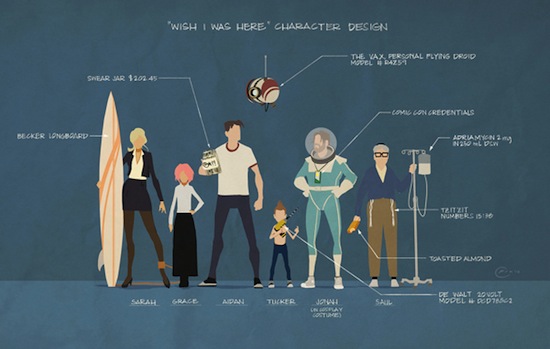Zach Braff, left, and Jim Parsons at the première for Wish I Was Here. (photo from facebook.com/wishiwasherefilm/photos_stream)
Zach Braff is unabashedly and proudly Jewish. One might not deduce that, though, from the caustic attitude toward organized Judaism expressed at the beginning of his new film, Wish I Was Here.
In his second foray as director, a decade after the indie success of Garden State, Braff plays a chronically unemployed, 30-something Los Angeles actor with a devoted wife (Kate Hudson) and two children in Jewish religious school. Braff’s Aidan Bloom is avowedly secular – his father (Mandy Patinkin) chose and pays for the kids’ education as a way of inculcating their Jewish identity – and Bloom delights in cracking cynical jokes about religion while driving his offspring to school. To underscore his disrespect, Bloom sneaks a hit on a joint after the children get out the car, only to be caught in the act by a rabbi.
“I don’t think the movie’s anti-Jewish at all,” Braff said in a recent interview in a San Francisco hotel. “My character says, ‘I’m envious of people with faith. They take comfort in their faith. I wish I had that to get me through this but, since I don’t, I’m a secular man, I need to find something that works for me.’”
The “this” is Aidan’s father’s illness and encroaching death, which throws a financial wrench in the kids’ private education and impels Aidan to become both a good son and a good parent. The film’s title refers to that dual challenge while evoking Aidan’s existential dilemma of needing something to believe in.
“If I was going to do PR for the Jews of America,” said Braff, “I would say, ‘There needs to be a more proactive way of connecting with Jews who identify with the culture and the humor and the holidays in a way that can tap into the spirituality that they have within themselves. So, any social commentary in the beginning on the yeshivah was meant to show here’s a secular guy who doesn’t know how to tap into his faith.”

Wish I Was Here, like Braff himself, blends unwavering self-confidence, clever one-liners and earnest philosophizing. Many viewers will be entertained by the acerbic dialogue and moved by the sentimental family resolution, while others will find Wish I Was Here an indulgent tonal pastiche epitomized by a sight gag of an elderly rabbi on a Segway visiting an intensive care unit.
Braff, of course, became a household name in the 2000s for his role in the long-running sitcom Scrubs. Most recently, he starred in the London première of his original play All New People, before making his Broadway debut in the musical adaptation of Woody Allen’s Bullets Over Broadway. He co-wrote Wish I Was Here with his brother Adam. The New Jersey natives borrowed from the early experiences of a third brother, Joshua (who is also a writer), in developing Aidan’s character.
“My brother went to a very strict yeshivah as a child and really was alienated from it, and had a very bad experience,” Braff related. “It wasn’t until shooting this movie, in the yeshivah we actually shot in, that I saw a Modern Orthodox school. It was a wonderful school, and the rabbis that I talked to were really charming guys and we actually had some interesting conversations about religion, and the kids were all happy and having a wonderful time.”
Braff leaned forward, warming to his point.
“So, I hope that any strict religious people reading this know that the movie is not condemning orthodoxy at all. It’s saying that, from my point of view, I wished I’d had in my life someone who could help me tap into my own spirituality better, instead of saying, ‘Here are the rules. Work within these rules.’”
Wish I Was Here has some fun (as noted above) with an aged rabbi. But a younger rabbi – who Braff described as “the dream rabbi I wished I met” as a young person – makes a contribution to Aidan’s journey of reconciliation with his father, an old-school guy who harangues Aidan to provide for his family and abandon his artistic ambitions.
“I took a Hinduism class in college and loved this idea that here are a bunch of allegories and wonderful stories and gods, and you can choose to find your own path,” Braff mused. “It isn’t so much like ‘These are the rules.’ It is ‘Here’s what we believe but find your own way.’ Now, I don’t know much more about Hinduism than an intro to Hinduism class, but I remember that striking me, as someone who’d been raised very strictly Jewish and kosher.”
Braff financed Wish I Was Here through a crowd-funding campaign last year, drawing flak in the process from those who thought well-off celebrities should reach into their own wallets. Without referencing the Kickstarter controversy, Braff makes the case for consumer support of his movie.
“The studio system isn’t going to make a movie about a Jewish family,” he asserted. “A financier wasn’t going to make a movie about a Jewish family. It’s very, very hard to get – we’re two percent and shrinking – a movie about Jewish people made. If I made this in the studio system, they’d be like ‘ix-nay on the ewish-jay.’ I’d have to [dial] it down. So, I hope that Jews will show up because I’d like to make more films about my Jewish experience, and it matters if they go to the theatre or not.”
Wish I Was Here opens in Vancouver on Friday, July 18.
Michael Fox is a San Francisco film critic and journalist.

